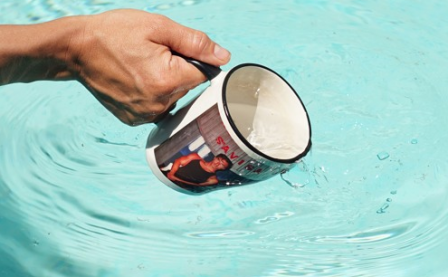In a video of a recent live show, the L.A. artist JAWS can be seen theatrically strutting about his audience, before the ‘polizei’ appears and interrupts proceedings. Since my German isn’t up to scratch, I would like to entertain the idea that the officer declares the music frankly too perverse to continue, but I concede that this probably isn’t the case. Really though, granting that it is more likely due to the use of a knife as a stage prop than anything musically hostile, the cause for a police presence is a nice allegory of the audaciousness of Stress Test.
Indeed, the aesthetic is decidedly punk — and in accordance with the provocative values of industrial music — but the dark and grimy sounds are equally indebted to, for example, recent bass-oriented musics that have emerged in abundance from the UK over the past decade. “Joined,” for example, is underlain with an evocative throbbing synth bass, which successively ascends and descends beneath a distant vocal, itself beckoning the listener to join something, somewhere.
Stress Test is the debut release by JAWS, a.k.a. Robert Girardin, who has previously been creatively involved with New York’s proclaimed ‘sound juggernauts’ Excepter. It also acts as a further addition to the catalog of Hundebiss Records, who — with recent killer releases by Sewn Leather, Popol Gluant, and Dracula Lewis — are upholding themselves as mainstays of DIY music. The Vernasca, Italy-based label deal in excessiveness and profusion, and with Stress Test they continue their deliverance of unadulterated sounds.
The record is dominated by brash synths and an ominously toned voice that sounds simultaneously weary and impassioned, culminating overall in a fairly nihilistic atmosphere. It is also concise, featuring just five tracks of which none are weak or uncertain. Opener “Request Line” begins with a machine gun-like kick sequence, heralding the echoic, reiterative drum machining that pervades the rest of the album. “Sufferer’s Song” similarly exemplifies a preoccupation with echo that has become increasingly conspicuous.
However, much like that of label-compatriot Sewn Leather, JAWS’ music is heavily oriented in performance, and it is difficult to feel a just degree of intensity when listening on record. Of course, this is the same for any performance-driven music. Writing about freely improvised music, for example, Derek Bailey’s conclusion regarding the “intermittent fuss over the validity of recording” is that it “overlooks certain realities” — namely that “records simply supply a different listening experience to listening live.” Admittedly and obviously true, it’s impossible to deny the superiority of the live performance when the music of JAWS is concerned, for there is no sonic replacement for a sweaty room filled with smoke, knives, and naked flesh wrapped in foil.
More about: JAWS




